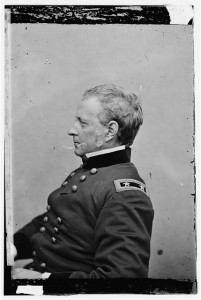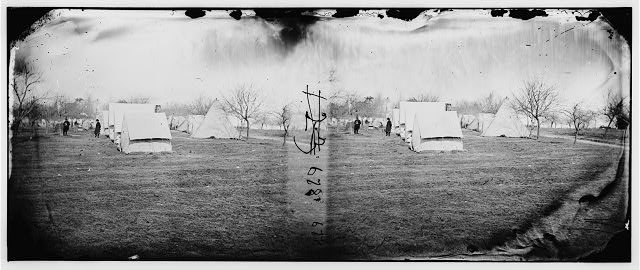From the Richmond Daily Dispatch March 7, 1863:
The condition of the Army of the Potomac.
A letter in the New York Tribune dated from the Army of the Potomac, gives a description of the working of matters there at present. It says:
Gen. Hooker has a straightforward way of doing at things which takes with the soldier. There is no show about him. He means business in every word, look and act. An instance of this plain, business like way of his of doing things occurred a few days since under my immediate observation. He came riding along where a brigade was being reviewed by its division officer. It was a short time previous to the hour for review, and the men were standing waiting in line. He appeared attended by only a single orderly, whom he immediately dispatched on some message. –While the orderly was absent the General rode down the line, but a few feet in advance of it, looking every man in the face as though he would look him through. Nobody seemed to know him, and most supposed him to be some curiosity hunting civilian. Many wondered what that old follow wanted, and some hinted aloud that he must be rather green to be riding down a line of battle in that manner. But the attendant coming back and respectfully reporting to him, he dashed off at a full gallop, and in such a manner as to make it evident that he was not only a military man, but one of some importance withal.
It was not until some hours after, however, that it was generally known to the soldiers that their General-in-Chief had paid them a visit, and then it was interesting to listen to their comments. “Did you see old Hooker this afternoon?”? said one of them to one of his comrades. “Yes,” was the reply, “if that chap that looked at us so was him” “Well, it was, they say, and ain’t he — of a fellow to be poking his nose around in that style. Mac always used to have a string of dukes and aids and princes as long as a funeral procession when he came; but I guess old Joe travels on his own hook, and looks into things for himself.” The parties moving on, I lost the further continuance of the conversation; but it was a fair specimen of what I heard that afternoon and evening.
“Hooker gives us soft bread and potatoes, and lets us go home; he’ll do,” I heard another say in allusion to recent orders. By the by, I learn that some, more officers than men proportionately, have taken advantage of recent orders and stayed over their time, thus rendering it doubtful whether the order be continued in execution. I hope, however, that the order will not be repeated, but that the delinquents will be made to suffer. I have seen the good effects in military life of punishing the few for the benefit of the many and I have likewise seen the evil effects of punishing the many because of the sins of the few. It universally breeds dissatisfaction, for it is essentially unjust.
So far, then, as the popularity or unpopularity of the chief with the men is concerned — a point to which undue importance is attached everywhere — I for one am willing to leave the matter where it stands. Gen. Jos. Hooker will be popular with men and officers. He evinces for the men all that care for their comfort and their health which made them like McClellan, and then he is a better fighting man. The soldier likes the General of pluck. Fighting with him, like charity with the Christian, covers a multitude of sins.
I enjoyed the contrast between Hooker riding with a single orderly and McClellan with “a string of dukes and aids and princes as long as a funeral procession”; however, in the April 18, 1863 issue of Harper’s Weekly (at Son of the Southartist Alfred R. Waud described “the large train of officers that accompany the general [Hooker]”, at least in the sense of being part of the headquarters complex. The balloon party sounds like a lot of fun.


